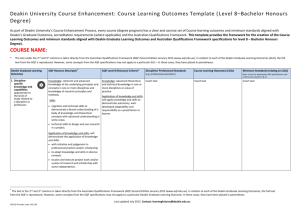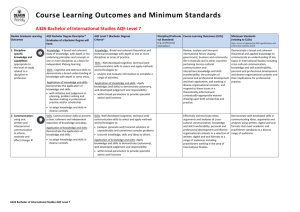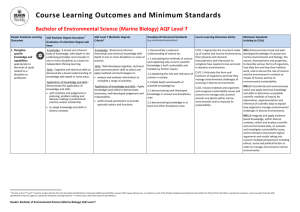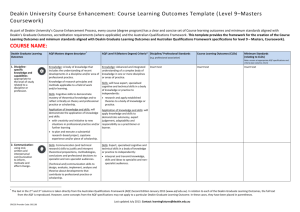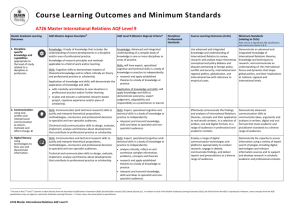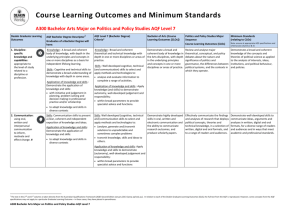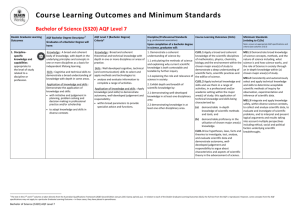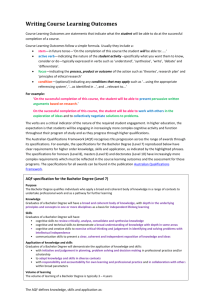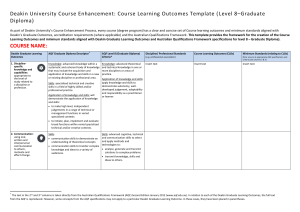Discipline-specific knowledge and capabilities: appropriate to the
advertisement
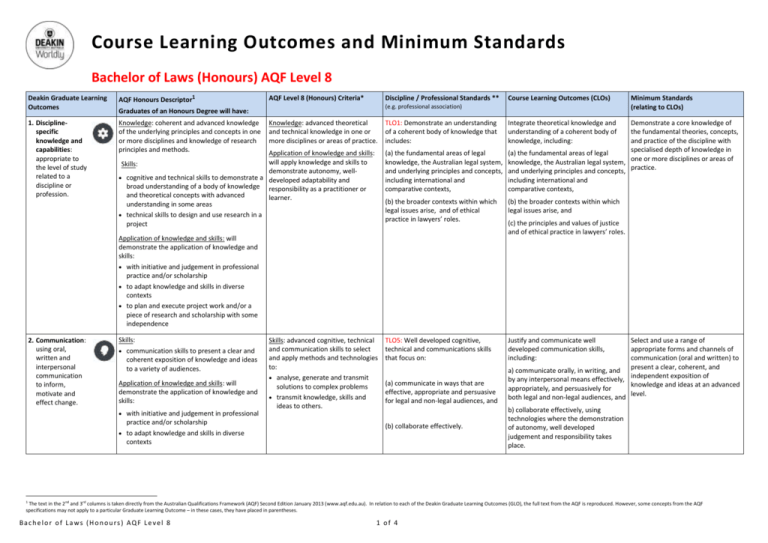
Course Learning Outcomes and Minimum Standards Bachelor of Laws (Honours) AQF Level 8 Deakin Graduate Learning Outcomes AQF Honours Descriptor1 1. Disciplinespecific knowledge and capabilities: appropriate to the level of study related to a discipline or profession. Knowledge: coherent and advanced knowledge of the underlying principles and concepts in one or more disciplines and knowledge of research principles and methods. AQF Level 8 (Honours) Criteria* Discipline / Professional Standards ** Graduates of an Honours Degree will have: Knowledge: advanced theoretical and technical knowledge in one or more disciplines or areas of practice. Application of knowledge and skills: will apply knowledge and skills to demonstrate autonomy, well cognitive and technical skills to demonstrate a developed adaptability and broad understanding of a body of knowledge responsibility as a practitioner or and theoretical concepts with advanced learner. understanding in some areas technical skills to design and use research in a project Skills: TLO1: Demonstrate an understanding of a coherent body of knowledge that includes: Integrate theoretical knowledge and understanding of a coherent body of knowledge, including: (b) the broader contexts within which legal issues arise, and of ethical practice in lawyers’ roles. (b) the broader contexts within which legal issues arise, and Skills: communication skills to present a clear and coherent exposition of knowledge and ideas to a variety of audiences. Application of knowledge and skills: will demonstrate the application of knowledge and skills: with initiative and judgement in professional practice and/or scholarship to adapt knowledge and skills in diverse contexts Skills: advanced cognitive, technical and communication skills to select and apply methods and technologies to: analyse, generate and transmit solutions to complex problems transmit knowledge, skills and ideas to others. TLO5: Well developed cognitive, technical and communications skills that focus on: Justify and communicate well developed communication skills, including: Minimum Standards (relating to CLOs) Demonstrate a core knowledge of the fundamental theories, concepts, and practice of the discipline with specialised depth of knowledge in (a) the fundamental areas of legal (a) the fundamental areas of legal knowledge, the Australian legal system, knowledge, the Australian legal system, one or more disciplines or areas of and underlying principles and concepts, and underlying principles and concepts, practice. including international and including international and comparative contexts, comparative contexts, Application of knowledge and skills: will demonstrate the application of knowledge and skills: with initiative and judgement in professional practice and/or scholarship to adapt knowledge and skills in diverse contexts to plan and execute project work and/or a piece of research and scholarship with some independence 2. Communication: using oral, written and interpersonal communication to inform, motivate and effect change. Course Learning Outcomes (CLOs) (e.g. professional association) (a) communicate in ways that are effective, appropriate and persuasive for legal and non-legal audiences, and (b) collaborate effectively. 1 (c) the principles and values of justice and of ethical practice in lawyers’ roles. Select and use a range of appropriate forms and channels of communication (oral and written) to present a clear, coherent, and a) communicate orally, in writing, and by any interpersonal means effectively, independent exposition of knowledge and ideas at an advanced appropriately, and persuasively for level. both legal and non-legal audiences, and b) collaborate effectively, using technologies where the demonstration of autonomy, well developed judgement and responsibility takes place. The text in the 2nd and 3rd columns is taken directly from the Australian Qualifications Framework (AQF) Second Edition January 2013 (www.aqf.edu.au). In relation to each of the Deakin Graduate Learning Outcomes (GLO), the full text from the AQF is reproduced. However, some concepts from the AQF specifications may not apply to a particular Graduate Learning Outcome – in these cases, they have placed in parentheses. B a c h e l o r o f L a w s ( H o n o u rs ) A Q F L e v e l 8 1 of 4 Deakin Graduate Learning Outcomes AQF Honours Descriptor1 3. Digital literacy: using technologies to find, use and disseminate information. Skills: cognitive and technical skills to demonstrate a broad understanding of a body of knowledge and theoretical concepts with advanced understanding in some areas technical skills to design and use research in a project communication skills to present and clear and coherent exposition of knowledge and ideas to a variety of audiences AQF Level 8 (Honours) Criteria* Discipline / Professional Standards ** Graduates of an Honours Degree will have: Application of knowledge and skills: will demonstrate the application of knowledge and skills: Course Learning Outcomes (CLOs) Minimum Standards (relating to CLOs) Use technologies to identify, locate, evaluate information for problem solving scenarios as well as communicating legal solutions, including: Use a range of digitally-based technologies in professional practice or scholarly activity or both to facilitate the evaluation, research, and resolution of discipline-based problems, and to disseminate this information. (e.g. professional association) Skills: advanced cognitive, technical The professional standards make no and communication skills to select specific reference to digital literacies. and apply methods and technologies to: analyse critically, evaluate and transform information to complete a range of activities analyse, generate and transmit solutions to complex problems transmit knowledge, skills and ideas to others. a) identify, research, evaluate and synthesise relevant factual, legal and policy issues, effectively using technologies where appropriate. b) find, use, and disseminate information using technologies. c) the use of digital sources to organize and present information in authentic and complex legal situations. to adapt (knowledge and) skills in diverse contexts with initiative and judgement in professional practice and/or scholarship to plan and execute project work and/or piece of research and scholarship with some independence 4. Critical thinking: evaluating information using critical and analytical thinking and judgment. Skills: cognitive skills to review, analyse, consolidate, and synthesise knowledge and identify and provide solutions to complex problems with intellectual independence cognitive (and technical) skills to demonstrate a broad understanding of a body of knowledge and theoretical concepts with advanced understanding in some areas cognitive skills to exercise critical thinking and judgement and developing a new understanding Application of knowledge and skills: will demonstrate the application of knowledge and skills: Skills: advanced cognitive, technical and communication skills to select and apply methods and technologies to: analyse critically, evaluate and transform information to complete a range of activities analyse, generate and transmit solutions to complex problems. TLO3: Well developed cognitive technical and communication skills to: (a) identify and articulate legal issues, (b) apply legal reasoning and research to generate appropriate responses to legal issues, (c) engage in critical analysis and make a reasoned choice amongst alternatives, and Application of knowledge and skills: (d) think creatively in approaching legal apply knowledge and skills to issues and generating appropriate demonstrate autonomy, wellresponses. developed judgement, adaptability and responsibility as a practitioner or learner. with initiative and judgement in professional practice and/or scholarship to adapt knowledge and skills in diverse contexts plan and execute project work and/or a piece of research and scholarship with some independence. B a c h e l o r o f L a w s ( H o n o u rs ) A Q F L e v e l 8 2 of 4 Exercise critical judgement with the ability to problem-solve in unpredictable and sometimes complex scenarios, including: (a) identifying and articulating legal issues, (b) applying legal reasoning and research to generate accurate and relevant responses to legal issues, (c) engaging in critical analysis and making a choice amongst alternatives using reasoning, and (d) thinking creatively in approaching legal issues and generating appropriate responses. Exercise sound judgement on routine and complex discipline issues based on analysis of relevant information gathered from a variety of sources. Deakin Graduate Learning Outcomes AQF Honours Descriptor1 5. Problem solving: creating solutions to authentic (real world and ill-defined) problems. Skills: cognitive skills to review, analyse, consolidate, and synthesise knowledge and identify and provide solutions to complex problems with intellectual independence cognitive skills to exercise critical thinking and judgement in developing new understanding technical skills to design and use research in a project. Skills: advanced cognitive, technical (and communication) skills to select and apply methods and technologies to: analyse critically, evaluate and transform information to complete a range of activities analyse, generated and transmit solutions to complex problems. Application of knowledge and skills: will demonstrate the application of knowledge and skills: with initiative and judgement in professional practice and/or scholarship to adapt knowledge and skills in diverse contexts to plan and execute project work and/or a piece of research and scholarship with some independence. Application of knowledge and skills: apply knowledge and skills to demonstrate autonomy, welldeveloped judgement, adaptability and responsibility as a practitioner or learner. 6. Selfmanagement: working and learning independently, and taking responsibility for personal actions. AQF Level 8 (Honours) Criteria* Discipline / Professional Standards ** Graduates of an Honours Degree will have: Skills: cognitive skills to review, analyse, consolidate and synthesise knowledge to identify and provide solutions to complex problems with intellectual independence Application of knowledge and skills: will demonstrate the application of knowledge and skills: Application of knowledge and skills: apply knowledge and skills to demonstrate autonomy, welldeveloped judgement, adaptability and responsibility as a practitioner or learner. with responsibility and accountability for own TLO4: Demonstrate the intellectual and practical skills needed to identify, research, evaluate and synthesise relevant factual, legal and policy issues. Application of knowledge and skills: will demonstrate the application of knowledge and skills: with responsibility and accountability for own learning and practice and in collaboration with others within broad parameters. Minimum Standards (relating to CLOs) Create solutions to a wide range of legal problems, utilizing analytical and critical thinking with the ability to problem-solve, including: Identify problems and formulate appropriate solutions related to authentic situations in the discipline. i. identifying and articulating legal issues, ii. applying legal reasoning and research to generate accurate and relevant responses to legal issues, iii. engaging in critical analysis and making a choice amongst alternatives using reasoning, and iv. thinking creatively in approaching legal issues and generating appropriate responses. TLO6: Apply knowledge and skills to demonstrate how to: (a) learn and work independently, and (b) reflect on and assess their own capabilities and performance, and make use of feedback as appropriate, to support personal and professional development. learning and practice and in collaboration with others within broad parameters to plan and execute project work and/or a piece of research and scholarship with some independence. 7. Teamwork: working and learning with others from different disciplines and backgrounds. Course Learning Outcomes (CLOs) (e.g. professional association) Reflect on performance feedback to demonstrate long term development and to facilitate self improvement, including: (a) lifelong learning and working independently, (b) reflecting on and assessing capabilities and performance, and making use of feedback as appropriate, to support personal and professional development. Understanding the importance of high quality work within stipulated deadlines, and putting in place mechanisms to overcome obstacles that may impede these objectives. (c) taking responsibility for personal actions. The AQF is silent on this. TLO5: Graduates of the Bachelor of Laws will be able to: (a) communicate in ways that are effective, appropriate and persuasive for legal and non-legal audiences, and (b) collaborate effectively. Collaborate and communicate in teams, including: (a) communicate in ways that are effective, appropriate and persuasive for legal and non-legal audiences; and (b) collaborate effectively with others from different disciplines and backgrounds. B a c h e l o r o f L a w s ( H o n o u rs ) A Q F L e v e l 8 Recognise own strengths and weaknesses and, through evidence of self-reflection and critique of own performance, identify and act on personal and professional development needs. 3 of 4 Constructively engage as a team player with peers from a range of disciplines and backgrounds in collaborative activities in familiar and unfamiliar situations. Deakin Graduate Learning Outcomes AQF Honours Descriptor1 8. Global citizenship: engaging ethically and productively in the professional context and with diverse communities and cultures in a global context Application of knowledge and skills: will demonstrate the application of knowledge and skills: AQF Level 8 (Honours) Criteria* Discipline / Professional Standards ** Graduates of an Honours Degree will have: Application of knowledge and skills: apply knowledge and skills to demonstrate autonomy, welldeveloped judgement, adaptability with responsibility and accountability for own and responsibility as a practitioner or learning and practice and in collaboration learner. with others within broad parameters. (Note: the AQF descriptor does not relate specifically and directly to global citizenship, however the above mentioned may be indirectly related to engagement within a professional context and/or within diverse communities and cultures by way of its link to responsibility and accountability ‘in collaboration with others’). Course Learning Outcomes (CLOs) Minimum Standards (relating to CLOs) To be aware of and apply legal knowledge in different environments and global contexts, including: Recognise the value that different perspectives can bring to situations; seek to better understand a range of social, ethical and global perspectives and their impact in a discipline specific environment; and, using this knowledge, act appropriately in ethically responsible ways. (e.g. professional association) TLO2: Demonstrate the application of knowledge and skills to: (a) an understanding of approaches to ethical decision-making, (a) an understanding of approaches to ethical decision-making, (b) an ability to recognise and reflect upon, and a developing ability to (b) an ability to recognise and reflect (Note: the AQF criteria for Level 8 do respond to, ethical issues likely to arise upon with a developing ability to not relate specifically and directly to in professional contexts, respond to ethical issues likely to arise global citizenship, however the above in complex professional contexts, (c) an ability to recognise and reflect mentioned criteria may be indirectly (c) an ability to recognise and reflect related to ethical engagement via the upon the professional responsibilities of lawyers in promoting justice and in upon the professional responsibilities reference to ‘responsibility’.) service to the community, and of lawyers in promoting justice and in service to the community, (d) a developing ability to exercise professional judgement (d) an ability to exercise professional judgement, (e) an ability to recognise and reflect upon cultural and community diversity. B a c h e l o r o f L a w s ( H o n o u rs ) A Q F L e v e l 8 4 of 4
